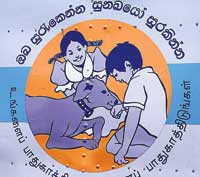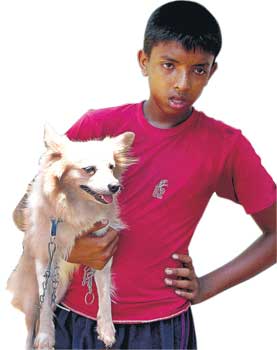
A dog's life?
It is already midmorning as we make our way through the winding streets of Kadiranawatta. The car must stop every few yards to avoid running over a child, a dog or the occasional chicken. This is a neighbourhood without gardens and most people choose to be sociable – not inside their tiny houses, but on the narrow, uneven streets… so it's no surprise that on the streets is also where you can find the family pets. Numerous dogs roam this area, mingling freely with humans. Unvaccinated and unsterilized for the most part, the numbers of stray dogs in the area is increasing, even as the incidence of rabies rises among both animals and humans. Enter The Blue Paw Trust. Determined to help both man and animal co-exist, Blue Paw has dedicated their fully-equipped, state-of-the-art, mobile clinics for touring areas like this. But vaccinating and sterilising the animals in the locality is only part of their work – the other half is educating the public. The rabies threat Rabies is today classified as a neglected, under-reported zoonotic disease, says the Blue Paw Trust, only made worse by the fact that if it is allowed to run its course it results in an agonising death for human and dog alike. If there's any good news, it's this: rabies is 100% preventable. And not only is prevention better than cure, in this case, it's also cheaper. This month, organisations like Blue Paw are upping the ante – intent on increasing awareness about rabies prevention the world over.
Stand up and
be counted "Unless the community gets involved, there can't be a long term solution," she says encouraging people to get involved with caring not only for their own pets, but animals in the immediate vicinity as well. "Most of the time, it's the young people who bring the dogs in," reveals Dr. Ganga de Silva, whose team of young doctors can cope with four operations simultaneously. Today, she and her team are parked in a playground, operating, injecting and watching over their canine patient's recovery. She and Shevanthi both emphasise the importance of getting every dog sterilised, making exceptions only in cases where owners intend to breed the animals. You might have a male dog, but if he hasn't been sterilised, he's likely to roam around, especially when other dogs are in heat, she explains. Fights are also common, and if your dog is bitten by another rabid animal, you won't have an inkling. While vaccinations must be done annually, sterilisation, like a diamond, is forever. Stray animals that have been sterilised can be identified by their notches on their ears, or upon examination by a vet. While being a responsible pet owner is the first step, it's not enough. Regardless of whether you do or do not own a dog, you can get involved not only with ensuring animals are treated humanely, but also with your communities safety. "By nature we love animals, we don't want to harm them… we harm them only because we are scared," says Shevanthi. "None of this need happen if we take the preventive action." Blue Paw can arrange talks at your school or institution, and also offer education material free of charge. They welcome volunteers and can be contacted on 0776925109. |
|| Front
Page | News | Editorial | Columns | Sports | Plus | Financial
Times | International | Mirror | TV
Times | Funday
Times || |
| |
Copyright
2007 Wijeya
Newspapers Ltd.Colombo. Sri Lanka. |

